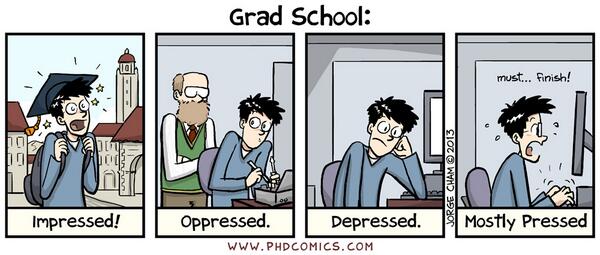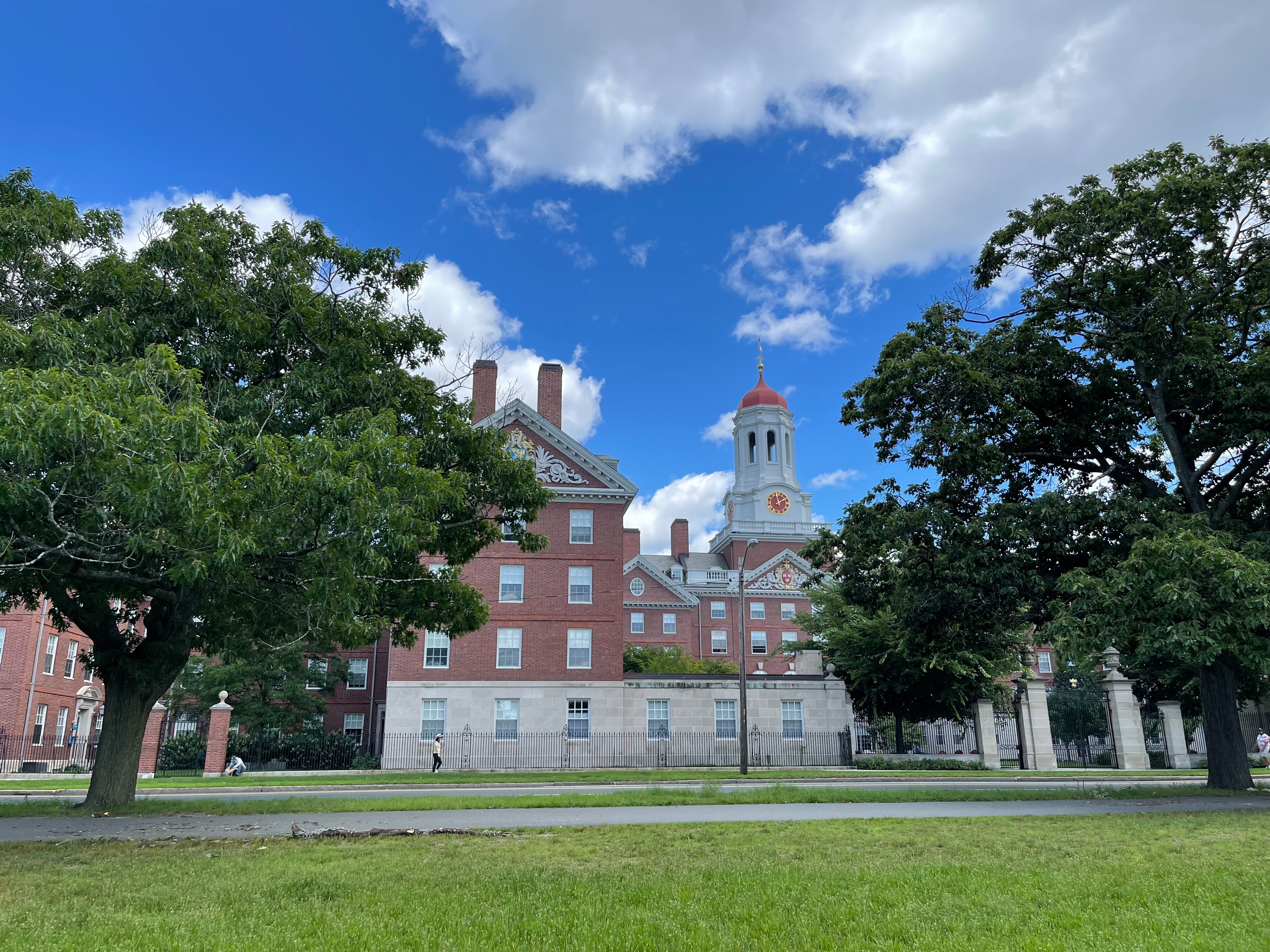'Are You Excited About Grad School?'
This was written in somewhat of a rush, and I’m (planning on) coming back to this later to revise it! In any case, I’m sharing this as part of a new habit to lower my threshold for pushing writing out, even if it’s not great. If you have any thoughts, let me know :)
“Are you excited about grad school?”, the person across from me asks. In one instance, it’s an office mate; in the next, it’s someone I just met. I’ve learned that around here, within Boston’s academic community, it usually doesn’t take long for conversation to steer toward the topics of what one is doing now, and what one plans to do next. My most frequent response is a brief “sure,” and more often than not, this elicits a laugh from the other person. I imagine they think I’m responding tongue-in-cheek; the academic world is filled with jokes about grad school being hell, and my (seemingly) unenthusiastic remark would definitely fit the theme.

While my cryptic reply of “sure” certainly wasn’t meant tongue-in-cheek, I must admit that it probably doesn’t do my true feelings justice. This text is an attempt at taking my four-letter response and shaping it into something more adequate.
Why? For one, I imagine I’ll be asked some version of some question relating to grad school many times in the future, and being able to swap out my frank “sure” with a URL linking to this elaborate text seems like a great idea (efficiency!). Secondly, and slightly more seriously, I currently stand at the very beginning of grad school, and it seems like a good time to capture my feelings of optimism and enthusiasm before I slowly descend into the pits of grad school hell. Lastly, and even more seriously, outlining what I hope and think I’ll be doing in grad school seems like a valuable reflection exercise to a) provide me with direction and b) provide me with something to return to in the future.
It feels fitting to start by exploring the term “grad school” itself, one that is often used in passing, just like in the introduction of this text. What exactly is “grad(uate) school” supposed to be? If the concept strikes you as vague, you’re not alone.
I first started thinking about this in the Spring months of 2023, when the bus I sat on every evening passed by Harvard, then MIT, and then crossed the Charles River to Boston University. With that, my daily commute home offered a parade of universities with renowned graduate schools. At that time, I was hoping to end up in grad school, but I had yet to hear back from the places I applied to.

One evening, as my bus trucked by the fancy red brick university buildings, it occurred to me that in Switzerland, where I grew up, the term “grad school” doesn’t exist. Rather, people would call it “getting a doctorate,” “doktorieren.” However, these two things are not the same: While the Ph.D. is the most common doctoral degree, completing a doctorate does not always mean getting a Ph.D., and going to graduate school doesn’t always mean obtaining a Ph.D., either.1 Rather, in the U.S., “grad school” is a catch-all for (post-)graduate education, including a variety of master’s and doctoral programs one can complete in Business school, Law school, Medical school, and more.
Boring technicalities aside, I’ve come to think of “grad school” as two things: A place and a kind of training. The place bit is relatively straightforward: Graduate schools (typically) have a physical location, often entailing multiple buildings split by profession or domain (think different building complexes for medical school, law school, school of business, etc.). You go to the place in question to do your training.
So far, so good. But what kind of training is it that one does in grad school? The short answer is: It depends on your type of grad school. But rather than try to cover all types of grad school, I’ll try to outline my thoughts on “my” type: Obtaining a Ph.D. in the “School of Humanities and Sciences.”
It didn’t take me much digging through my Ph.D. application notes to find that from the very start, my motivation for doing a Ph.D. was (and remains) to train to be a “researcher” or “scientist.” Fei-Fei Li describes this nicely:
My Princeton professors often said that postgraduate studies weren’t just another academic milestone but a turning point, representing the first transition from being a student to becoming something like a true scientist, turning a passion into a journey and an affinity into an identity, tempering an education to become the foundation of a career, a reputation, and a life. It was an encouraging thought that clarified the question I faced but made it all the more vexing as well. I knew I wanted to be a scientist, but what kind? For what purpose, exactly? How would I know?
(From Fei-Fei Li’s The Worlds I See)
Training to be a Researcher
As Fei-Fei Li makes apparent, one question that follows from all that is, what does it mean to “train” to be a “researcher” of some “kind”? My answer to this question is, and perhaps must be, a personal one. In my current thinking, there are four parts to the training: It involves learning to ask “good” questions, outlining what it is you’re studying, building a foundation of technical skills, and learning to communicate.
1. Learning to Ask “Good” Questions
In many ways, our grandest stories of science’s success involve people arriving at answers to questions, from how we humans—and other living beings on earth—evolved as a species, to how gravity works, to what the origin of the universe is. Yet, to arrive at such answers (and we can argue about what it means to “arrive” at an “answer”), one first needs to ask a “good” question. In other words, the answer you get is defined by—or at least constrained by—the question you ask.
If there’s anything I’ve learned from my past two and a half years in research, it’s that asking good questions is really, really hard. You want the question to be well-defined and specific, but not so much that it loses out on its breadth of implication. You want it to be testable, but not in a way that enforces a rigid binary of answers. You want it to be novel but also grounded in what we (think to) know already. In some sense, all of what I just said comes with some degree of vagueness. This, I think, is the core of my point: Learning to ask “good” questions seems to be – at least partly – grounded in intuition. A well-trained scientist looks at a “good” question and senses that it’s good. They look at one that needs refinement, can tell that it is not quite there yet, and identify its shortcomings. This, I think, is an intuition—and skill—that is developed in grad school. As far as I can tell, this happens through a combination of observation, messing around, reflection, and repetition: You observe others in how they form their questions, you mess around with your own questions, you reflect on the outcome, and you repeat this process in service of getting better at posing “good” questions.
Paul Graham has a quote on this I really like:
One of the biggest misconceptions about new ideas is about the ratio of question to answer in their composition. People think big ideas are answers, but often the real insight was in the question. Part of the reason we underrate questions is the way they're used in schools. In schools they tend to exist only briefly before being answered, like unstable particles. But a really good question can be much more than that. A really good question is a partial discovery. How do new species arise? Is the force that makes objects fall to earth the same as the one that keeps planets in their orbits? By even asking such questions you were already in excitingly novel territory.
2. Outlining What it is You’re Studying
In the process of identifying “good” questions, you are also outlining what exactly it is you’re studying. Personally, as a “cognitive scientist,” I’m interested in studying the human mind. More specifically, I’m interested in how we humans – particularly our youngest and most impressive learners, children – construct an understanding of the world around us as well as an understanding of ourselves, with a focus on the capacities and mechanisms that drive and enable these mental “construction” processes.

Much of our “most successful” science—particularly the natural sciences, including physics, chemistry, and biology—have concerned themselves with describing the phenomena of the external world; i.e., that which is around us, and the laws governing that which is around us. But there is also that which is within us humans, particularly our minds, and that which governs our minds. Relative to our understanding of what’s “out there,” we know only little about the nature and laws of the things residing within our minds – what’s “in here” –, including the “cogs and wheels” that drive our minds.
If human thought is not just an illusion (fingers crossed), we should be able to systematically capture, investigate, and describe its structure and intricacies. All the above, of course, is laden with assumptions, and people have written entire books making a case for why this is a plausible lens to apply to the study of human minds. The most succinct summary I’ve found so far is one given by Alison Gopnik:
The fundamental idea of cognitive science is that the brain is a kind of computer designed by evolution to perform particular cognitive functions. The promise of developmental cognitive science is that we can discover the computational processes that underlie development.
(From Alison Gopnik & Henry Wellman’s 2012 paper)
I think now is an extremely exciting time to get involved in Cognitive Science. Not only is it a young field with much to be discovered, but in recent decades, we’ve seen an influx of talent, with mathematicians, computer scientists, physicists, philosophers, linguists, anthropologists, neuroscientists, economists, and various interdisciplinarians joining forces. Thanks to the many minds contributing to the literature, and the exciting developments in recent decades (e.g., in terms of computing power and research instruments such as brain scanners), the field is being propelled forward at perhaps the most rapid speed since its inception.
3. Building a Foundation of (Technical) Skills
As the above quote from Gopnik & Wellman reveals, my particular kind of research relies on some notion of computation. While computation is not exclusive to computers, we often rely on computers to do computation for us.2 At least as of now, I think of computers as nothing more than a tool. I would argue that research is overwhelmingly done with the help of various tools – literature tools, data collection tools, measurement tools, analytical tools. Training to be a researcher involves becoming adept at the skills necessary for using these tools: Learning to navigate and harness the existing literature (e.g., using reference management software), to collect data precisely and efficiently (e.g., using online research platforms and equipment for in-person use), to construct, use, and modify various measurement instruments (e.g., brain scanners or eye-trackers), and to leverage analytical tools and methods for data evaluation (e.g., statistical analyses and mathematical models). Graduate school facilitates the acquisition of these technical skills through classes and “learning by doing”; that is, you pick up the skills relevant to your research by conducting your research.
4. Learning to Communicate (Research)
Doing research is all good and well, but research results are not always (if ever) obvious in their interpretation and broader practical value. In my current view, universities are primarily places that build and extend human knowledge. Society and its institutions do their best to employ said knowledge in service of its people. Communication is not only essential for sharing the acquired knowledge with one’s collaborators, colleagues, and fellow experts, but also with policymakers, people from industry, journalists, and the broader public. Researchers do an awful lot of writing and quite a bit of presenting, but doing these well is hard and doesn’t come naturally to everyone (if anyone at all). A big part of graduate school, then, is learning to write and present well by practicing, experiencing failure, receiving feedback, reflecting, and iterating.
Conclusion: So You’re Saying You Think The Above is Fun?
All that to say, learning to ask “good” questions relating to the things I care about, and acquiring and employing various tools and skills to answer said questions, is what I think graduate school is for; what I hope it to be for. You might come away from all this thinking “This sounds horrible.” For some reason, I came away from all this thinking “This sounds great.” In other words, I think that the above gives me lots of reasons to conclude that, yes, I am indeed “excited” about grad school. This is how I ended up in this position.
There is, however, an additional, more poetic component to this. Fei-Fei Li describes it well:
Research triggered the same feeling I got as a child exploring the mountains surrounding Chengdu with my father, when we’d spot a butterfly we’d never seen before, or happen upon a new variety of stick insect. Time lost its meaning in the lab, and I lost myself in the work. After an adolescence spent feeling as if I never really belonged, I was suddenly certain I’d found my place.
(From Fei-Fei Li’s The Worlds I See)
In my own childhood, when I entered the first grade of elementary school, I hoped that school would mean getting to ask lots of questions and receiving answers to said questions. My hopes were shattered within the first few weeks; there was little time for questions, and given that many of my inquiries were unrelated to class content (e.g., asking “what makes volcanoes explode?” in German class), they were rather unwelcome. It took me an additional 21 years—until now, that is—to reach something like the “school” I originally envisioned. In that sense, it’s not very surprising that I’m thrilled to now be paid to do what six-year-old me was dying to do. What’s more, I now get to be surrounded by people much more brilliant than me, who are eager to discuss and find answers to these questions together.
Ultimately, time will tell if my initial assessment matches my actual experience in grad school, most of which still lies ahead of me. As I finish writing this text, I realize I’ve perhaps done the world a disservice: Not only have I gone from a simple four-letter “sure” to an insanely long essay that is likely painful to read, but I have also robbed my future conversation partners of the chance to laugh at my frank, flat-faced response. I hope you’ll forgive me.

-
While the Ph.D. is the oldest (research-based) doctoral degree, there are many different doctoral degrees, with some variation by country. Other examples are the doctor of medicine, doctor of law, doctor of engineering, and doctor of education. ↩
-
I cringe a bit looking at this text now (it’s more than three years old), but I think most of what I wrote in it is still true. ↩